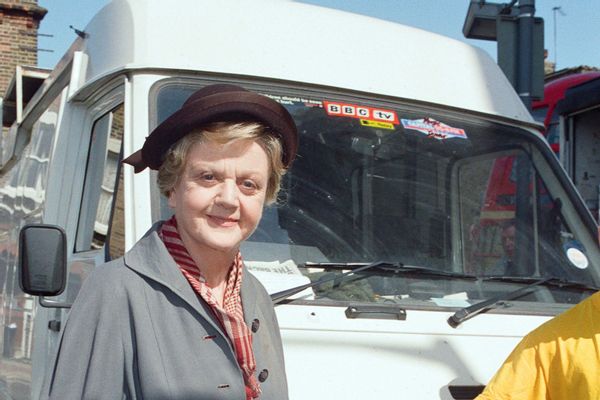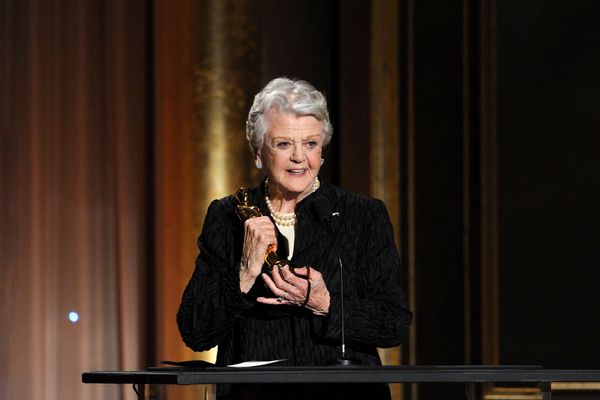
The appeal of "National Velvet" was the horse.
With a young Elizabeth Taylor as the lead, a restless, big-dreaming girl who becomes the jockey for her horse, and Mickey Rooney as Mi, my parents probably thought they were introducing my little sister and me to serious culture while entertaining our horse girl phase. But we stuck around for Dame Angela Lansbury.
In the 1940 film, Lansbury plays the older sister, Edwina, to Taylor's Velvet. She's brash, beautiful and selfish at first, swooning over a boy. "What does it feel like to be in love with a horse?" she says to her little sister dismissively with a pout. It takes a strong performer to make an unlikable character not only believable but beloved.
That was Lansbury. The actor was the world's big sister, and losing her feels like a part of the family is gone. She died Tuesday in Los Angeles. Lansbury was 96.
Born in London in 1925 to an actor mother (Moyna Macgill) and politician father, Lansbury started acting as a teenager in Shakespeare performances. With the war raging, her family moved to the United States, ending up in Hollywood. At 17, Lansbury appeared onscreen for the first time as the housemaid in "Gaslight," the 1944 film that would spawn a psychological movement or at least, a name for the manipulation seen in the story, where an abusive husband tries to convince his wife that her reality is not her own. In "Gaslight," Lansbury's Nancy, the new maid, is huge-eyed and bold, speaking volumes with a slight dip of her voice or flicker of her glance.
Right from the beginning, she was trying to warn us.
Signed to MGM, Lansbury followed "Gaslight" with her sullen sister turn in "National Velvet" and "The Picture of Dorian Gray," racking up two Academy Award nominations and a Golden Globe along the way. She would go on to receive six Golden Globes, 18 Primetime Emmy Awards and three Academy Award noms, not to mention a slew of lifetime achievement awards and six Tonys. In 2014, Queen Elizabeth II appointed her Dame Commander of the Order of the British Empire.
But first, she was typecast by MGM and cast less often than other actors. She appeared in a handful of hardly stellar films, frequently in minor and dastardly roles. "Mr. Mayer kept casting me as a series of venal bitches," she wrote in her autobiography. Her character slaps Judy Garland in "Harvey Girls." She played a maid again, a villainous one, in 1951's "Kind Lady." Unhappy with her film career, Lansbury turned back to theater and radio plays, and also started appearing in television. She appeared as the lead in "Mame" on Broadway in 1966, gold-lamé pajamas and all.
It was that emotion which made her difficult characters different.
According to her biography, many fans who wrote her letters believed she was in her 40s when she was only in her 20s. Film miscasting didn't help, but Lansbury always had that old soul charm. In her early performances, she looks like she's keeping some kind of secret. She knows, and we the viewers are just trying to keep up, to be let into the deep well of her eyes.
Perhaps seeking to escape her villain roles, she turned down the role of Nurse Ratched in "One Flew Over the Cuckoo's Nest." In 1971, she accepted her first lead in an onscreen musical: the witch Eglantine Price in the Disney film "Bedknobs and Broomsticks."
Lansbury's Eglantine is no-nonsense but with a heart as she's placed in charge of young siblings evacuated during the Battle of Brittan, in a story not too removed from her own. It's delightful film, one I watched so many times, the VHS tape started to fuzz. It's "Mary Poppins" for the Halloween crowd, "Hocus Pocus" with much more magic and delight, with its animated sequences, a witch correspondence school and fights with Nazis. Eglantine may have been surprised to be saddled with the children, but she's going to sing and dance about it (and enchant a bedpost).
Still, she told NPR, "I'm not really a singer. I have a serviceable voice, but how I use it — it's the emotion under the note that sells the song."
She may be bloodthirsty but she always wants the best for us.
It was that emotion which made her difficult characters different, including tough figures like the plotting mother of brainwashed Laurence Harvey in the 1962 film "The Manchurian Candidate," or stage mom Mama Rose in the 1974 Broadway revival of "Gypsy," or baker Mrs. Lovett, she of the human meat pies, in Stephen Sondheim's 1979 musical "Sweeney Todd."
She may be bloodthirsty but she always wants the best for us.

That man was Charles Manson.
Lansbury also helped two of her teen children deal with substance abuse, at a time when there was little to no support about heroin addiction and the prevailing attitude toward those struggling was not like Lansbury's stance, which was love.

A thing you should know:
— Rebecca Makkai (@rebeccamakkai) October 11, 2022
In September, 1987, Angela Lansbury headlined a show that packed the Chicago Theater with 2,400 people to raise money for AIDS research. It was the first major AIDS benefit in Chicago, and it raised $1 million. 🧵 pic.twitter.com/lpKHNlGbsu
Lansbury was an outspoken supporter of the gay community her whole life. "I am very proud of the fact that I am a gay icon," she said in an interview when she was 88.
Lansbury was wise without being a know-it-all, even though she did actually know it all.
Part of Lansbury's specialness was her wide-ranging appeal, from queer fans who may have first known her from "Mame" or other Broadway hits, to children, introduced to her as the voice of the teapot in Disney's "Beauty and the Beast." Lansbury was wise without being a know-it-all, even though she did actually know it all, from her gently chiding Mrs. Potts to Mrs. Jessica Fletcher.
With "Murder She Wrote," Lansbury found a character who would endure, making a senior citizen, a mystery novelist who solves murders, a star. The show ran for 12 seasons and introduced the world to cozy crime while also shining a spotlight on bookish writers; Jessica Fletcher was a former English teacher, and some of her friends in the show are teachers or professors.
Lansbury's Jessica Fletcher is the nosy neighbor who wants you to be happy, or at least, alive. She wants you to survive, but if you don't, she will get to the bottom of it, never fear. She's the kind of character you dream of living next door, gently warm, caring and capable. The actor stubbornly resisted the network's attempts to write a romance for her, and Jessica Fletcher remained solo, a Maine widow who doesn't drive who nevertheless has a huge social circle, and who helped raise her nephew, because mothers come from everywhere.
Like Lansbury, the cool sister who grew into the wise aunt.
Lansbury did it her way, but she brought us along for every step, every nuanced role that only deepened as she aged and became that most unlikely thing: an older woman holding her own in Hollywood. As she told NPR, "I was never going to get to play the girl next door, and I was never going to be groomed to be a glamorous movie star, and I sort of realized that, so I had to make peace with myself."







